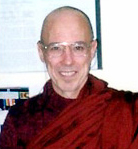Abstract: The Prospects for Reviving Bhikkhunã Ordination in the Theravàda Tradition
by Ven. Bhikkhu Bodhi
In this paper I will discuss the legal and ethical grounds for and against a restoration of bhikkhunã ordination in the Theravàda tradition. This paper will be divided into three main sections. In Part I, I will review the arguments laid down by Theravàdin traditionalists, mainly the Vinaya specialists who see a revival of bhikkhunã ordination as a legal impossibility. In the course of this discussion, I will also include a subsidiary examination of the status of the sikkhamànà and deal with the disputed question whether bhikkhunã ordination given to a candidate who has not undertaken the sikkhamànà training is invalid.
In Part II, I will offer several considerations in support of the claim that bhikkhunã ordination should be resuscitated. These considerations fall into two groups. One is based on past precedent, namely, the authorization given by the Buddha himself in the canonical texts for the creation of an order of bhikkhunãs. The other is based on contemporary conditions, especially the ideals of gender equality and non-discrimination that became intrinsic to the present-day world view following the European Enlightenment of the late eighteenth century. When such ideals have become so widespread in the outlook of educated people in the secular world, I will hold, to insist on exclusionary policies based on gender discrimination in religious life is likely to have the effect of discouraging the confidence of people who might otherwise be attracted to Theravàda Buddhism.
Finally, in Part III, I will briefly consider the legal mechanics of restoring the bhikkhunã ordination to the Theravàda tradition, that is, the ways it might be restored that harmonize most smoothly with the existing legal stipulations of the Vinaya. I will contend that while no method can be found that perfectly meets the demands of strict Vinaya legalism, the higher spirit of the Dhamma warrants an attempt to soften these demands and develop an application of the Vinaya that is flexible and accommodating rather than rigid and rejecting.
1 Foundation of the Bhiksuni Order
10.00 – 11.30 a.m.
- Analayo: The Four Assemblies and the Foundation of the Order of Nuns
- Dr. Ute Hüsken: The Eight Garudhammas
- Prof. Dr. Oskar von Hinüber: The Foundation of the Bhikkhuni as a Model for a Revival
- Gisela Krey: The Acceptance of Women in Early Buddhism
- Prof. Dr. Noritoshi Aramaki: Mahapajapati Gotami as the Bhikkhuni
Moderator: Prof. Dr. Michael Zimmermann
Lunch Break 90 min.: 11.30 a.m. – 13.00 p.m. (university canteen 5 min. walk)
2 Bhiksuni Ordination
13.00 – 15.40 p.m.
- Bhikkhuni Sik Wei-Chun: The Legal Procedures for the Bhiksuni Ordination
- Acarya Geshe Tashi Tsering: A Summary of Research Works on Bhikshuni Ordination. Revival in Mulasarvastivada Tradition Flourishing in Tibet
- Prof. Bhiksuni Heng-ching Shih: Three Options: Re-establishing the Bhiksuni Lineage in the Tibetan Tradition
- Bhiksu Huimin Shih: An Inquiry Concerning the Lineage of Bhikkhuni Ordination
- Dr. Petra Kieffer-Pülz: Presuppositions for a valid ordination with respect to the restoration of the bhiksuni ordination in the Mulasarvastivada tradition
- Dr. Shayne Clarke: Creating Nuns Out of Thin Air: Problems and Possible Solutions concerning the Ordination of Nuns according to the Tibetan Monastic Code
- Dr. Ann Heirman: Sramaneris and siksamanas in the Dharmaguptaka tradition
- Inyoung Chung (Bhiksuni Sukdham): The Revival of a Dual Ordination for Korean Buddhist Nuns in the Modern Period
Moderator: Bhiksuni Jampa Tsedroen
Refreshments 20 min.: 15.40 – 16.00 p.m.
3 History of the Bhiksuni Order
16.00 – 18.00 p.m.
- Prof. Dr. Peter Skilling: Tracing the History of Nuns in South Asia
- Mettanando Bhikkhu: The First Council
- Damchö Diana Finnegan: A Flawless Ordination: Some Narratives of Nuns' Ordinations in the Mūlasarvāstivādavinaya
- Prof. Dr. Florin Deleanu: Between State Control and State Neglect: Nuns in Ancient and Early Mediaeval Japan
- Dr. Ivette Maria Vargas-O'Bryan: Remembering the Ordained Nuns: Models for Modern Tibetan Communities
- Dr. Shobha Rani Dash: Misinterpretations of the Buddhist Texts and the Problem of Ordination of Women
Moderator: Prof. Dr. Lambert Schmithausen
Dinner/Tea break 60 min.: 18.00 – 19.00 p.m. (university canteen 5 min. walk)
Buddhismus (Foundation for Buddhist Studies) and
takes place in co-operation with the
Asia-Africa-Institute of the University of Hamburg.
See our list of sponsors.

